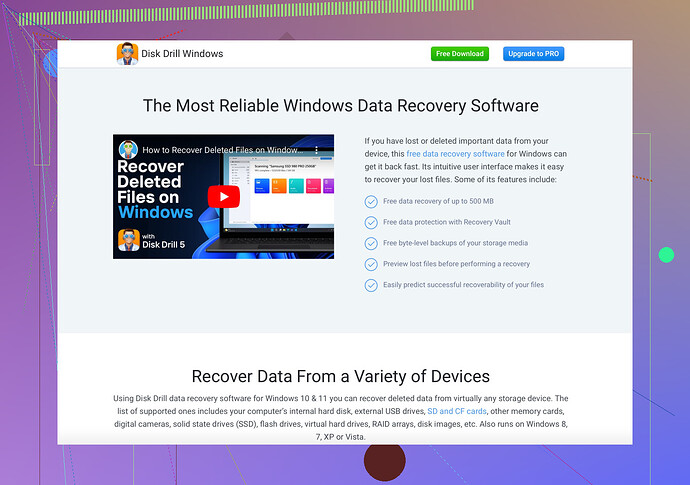I accidentally deleted important files from my computer and a friend recommended Recuva for data recovery. Can someone share their experience with this software? Does it really recover deleted files effectively? Any tips or things I should know before using it?
Been there, done that. ![]() I once deleted a folder with all my grad school assignments and nearly had a heart attack. So, I tried Recuva, and here’s my take.
I once deleted a folder with all my grad school assignments and nearly had a heart attack. So, I tried Recuva, and here’s my take.
Pros:
- User-Friendly Interface: Super easy to navigate, even if you’re not tech-savvy.
- Quick Scan/Deep Scan: You can choose between a quick scan for recently deleted files and a deep scan for files deleted a while back.
- Preview Feature: Lets you see file previews before recovery, which helps ensure you’re recovering the right stuff.
Cons:
- Hit-or-Miss Recovery: It’s not foolproof. Sometimes it doesn’t recover everything, especially if the files have been overwritten.
- File Quality: Occasionally, some recovered files might be corrupted or partially recovered.
Tips if you choose to use Recuva:
- Act Fast: The sooner you try to recover files, the better your chances.
- Don’t Overwrite: Avoid using the drive where your deleted files were stored until you attempt recovery.
- Deep Scan: Always start with a quick scan, but be prepared to run a deep scan if necessary. It takes longer but yields better results.
Okay, but here’s the thing. Recuva’s good but if you’re serious about recovering your files, I’d also recommend checking out Disk Drill Data Recovery Software. It’s robust, deals better with file corruption, and supports recovery from multiple types of storage devices. Plus, it’s got excellent reviews!
So yeah, Recuva is decent for basic needs, but Disk Drill might give you that extra layer of recovery reliability.
Ugh, been in the same boat. Definitely not fun when you accidentally delete crucial files. I used Recuva once when I lost some work documents. Here’s my take:
Pros:
- It’s pretty intuitive, so you don’t need to be a tech wizard to navigate.
- Quick scan does an okay job if you deleted the files recently.
- The preview is handy to check what you’re recovering.
Cons:
- Sometimes it’s a gamble whether it finds all your files, especially if they’ve been overwritten.
- Quality isn’t always spot on; some files came back corrupted or incomplete.
Extra tips if you go with Recuva:
- Act quickly – recovery chances drop the longer you wait.
- Avoid saving new files on the affected drive until you’ve tried recovery.
- Start with a quick scan, then move to a deep scan if you’re not seeing results.
That said, if you’re looking for a stronger option, you might want to consider Disk Drill. It’s got better reviews for handling file corruption and varied storage devices. You might get that extra reliability you’re looking for.
So yeah, Recuva is decent for simpler needs, but if the files are critical, I’d trust Disk Drill.
Okay, let me break it down using an Analytical Breakdown approach—'cause sometimes we’ve gotta get a little technical.
Pros:
- User-Friendly: As others mentioned, Recuva’s interface is straightforward enough for anyone to handle. That’s always a plus when you’re in a crisis.
- Scan Options: The dual approach with both quick and deep scans is versatile. Quick for recent mishaps, deep for stuff that’s been lost for a while.
- Preview Feature: Seeing before recovering definitely reduces the guesswork.
Cons:
- Recovery Reliability: Similar to what @vrijheidsvogel and @cazadordeestrellas said, Recuva can be a bit hit or miss. Overwritten files are often toast.
- File Quality: There’s a non-negligible chance some recovered files might be corrupted or incomplete.
RE: Disk Drill
If you’re after reliability and robustness, Disk Drill is often heralded as a better choice. Here are some points to think about:
- Enhanced File Recovery: Disk Drill reportedly deals better with corruptions and fragmented files, which might boost successful recoveries.
- Versatile Device Support: It extends recovery to various storage devices—USB, external drives, what-have-you.
- User Interface: Some users find it even more intuitive than Recuva, making it a breeze to use.
Pros of Disk Drill:
- Robust recovery algorithms mean higher success rates.
- Supports a wide range of file systems and devices.
- Has additional data protection tools like Recovery Vault to avoid future losses.
Cons of Disk Drill:
- Can be expensive compared to free tools like Recuva.
- Some features might be overkill for basic recovery needs.
Competitors:
- EaseUS Data Recovery: Another big contender, known for its efficiency across different storage mediums.
- Stellar Data Recovery: Similar vein, great for photo, video, and document recovery.
My Take:
While Recuva gets the job done for straightforward, low-stakes scenarios, if you’ve got irreplaceable files on the line, investing in Disk Drill could be a wise move. It’s like choosing between a Swiss Army knife and a specialized tool kit—both have their place depending on the job at hand.
